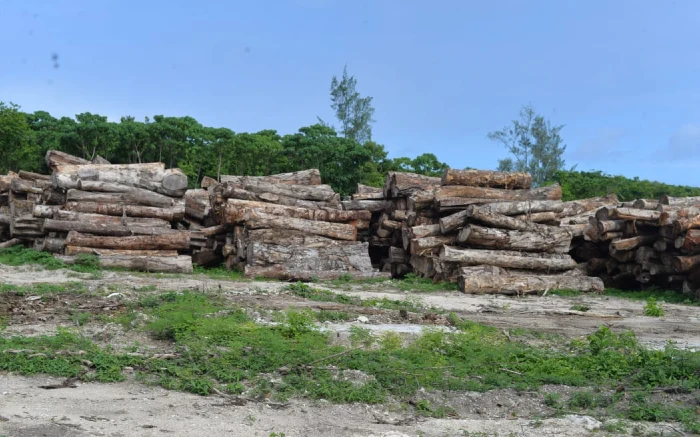In Vanuatu, a Chinese logging company, Vanuatu Forest Industry Ltd (VFIL), has stirred up controversy, as Chinese companies operating in other nations often do.
Amidst political turmoil, residents noticed something unusual: workers in Chinese military uniforms chopping down trees. The concern? These operations were happening without proper permission on Santo Island. In short, those workers were stealing healthy, mature trees.
Vanuatu’s forest authorities didn’t let this slide.
They’ve clamped down on VFIL, stopping their log exports dead in their tracks. The reason? Landowners are up in arms, claiming their trees were taken without a ‘yes’ from them.
“It’s like they just took over,” one resident who prefers to remain anonymous said, pointing out the odd sight of uniformed workers and unlicensed vehicles. In just three months, while Vanuatu was busy swapping prime ministers, these workers were busy clearing land.
Exporting round logs from Vanuatu is banned. Yet, in 2021, a government probe found endangered rosewood, a favorite for Chinese furniture makers, being smuggled out to China.
This incident isn’t just about trees. It’s about global power plays, too. Vanuatu, where the U.S. and China are flexing their muscles for influence, says it’s playing neutral, but China’s the biggest lender around these parts.
The Chinese embassy in Vanuatu was quick to distance itself. “These workers aren’t ours,” a spokesperson said. And VFIL? “Just a private company,” they added, making it clear that if VFIL crossed lines, Vanuatu would deal with it.
VFIL’s boss, Li Hongqi, had his say too. Those uniforms? Just practical gear from China, nothing more. “Easier for me to manage,” he explained. After the ban, Li said VFIL hit pause on their operations, vowing to play by Vanuatu’s rules.
But here’s a bit more context. VFIL isn’t new in town. They set up shop in 2019 and got a license in 2020 to clean up after a cyclone. They even promised a wood chip mill for the locals – a promise still hanging in the air. Yet, letters and chats with police tell a different story. Trucks without plates, trees still falling – landowners in Port Vila weren’t happy.
Denis Savoie, a local farmer, didn’t mince words: “They ended up slashing all the trees… They have stolen trees.”
And the uniforms? They raised eyebrows. In a town that once hosted U.S. forces in World War Two and where China recently beefed up a wharf, seeing uniforms that mirror China’s Navy sparked concerns. “It’s concerning and odd,” noted Anne-Marie Brady, a political science professor.

Photos showed these workers, in blue camo, lounging next to machinery in the forest. Li confirmed they were his team. But Brady wasn’t just worried about the uniforms. “It’s also concerning… they are cutting pristine forest, and now they are clearing the land,” she said.
Li’s plans for VFIL were ambitious. Before Cyclone Harold, he aimed to build a rosewood plant in China for Vanuatu’s timber. But now, he says, those plans are off the table.
More To Discover
- EU Shakes Up Eco-Market: Bans ‘Greenwashing’ in Landmark Environmental Legislation
- Australia Intensifies Crackdown on Greenwashing in Investment Sector
- Vanishing Forests: Unveiling the Global Threats and Urgent Solutions (We Name Names)
- The Zero-Energy Ultrathin Film That Can Protect Crops and Slash Food Waste
As this unfolds, it’s clear that the actions of Chinese companies overseas, like VFIL in Vanuatu, often reflect back on the intricate relationship between business and politics in China. Many large Chinese firms, especially those with global footprints, are influenced or controlled by the Communist Party of China. This relationship can steer their international ventures in ways that align with China’s broader geopolitical goals. VFIL’s story in Vanuatu is just one example of how these dynamics play out on the world stage.
To understand why Rosewood is so valuable, we tracked down this 8-minute video from the BBC. While it focuses on the illegal logging and trade in Africa, because this is a global problem after all, it’s worth a watch.



















